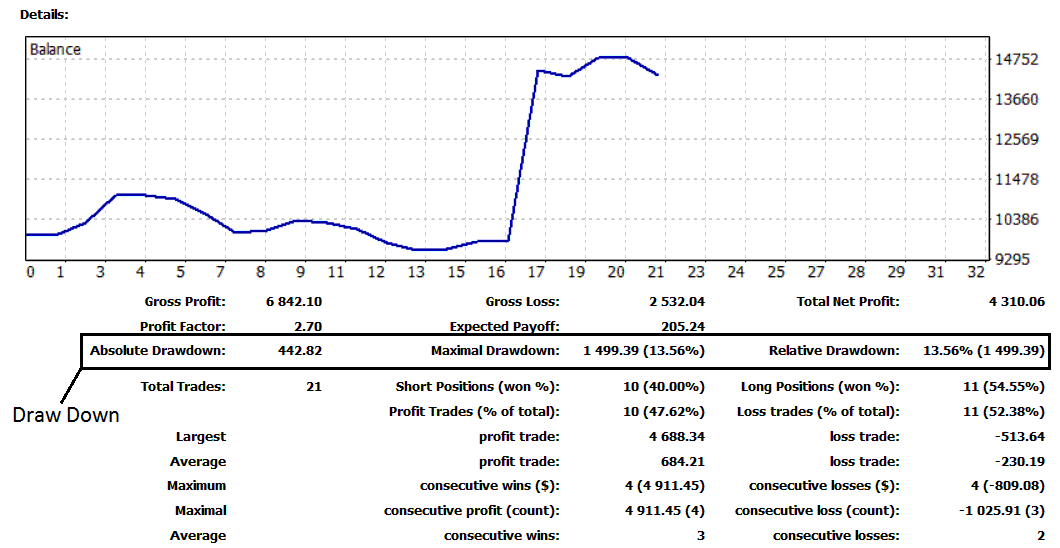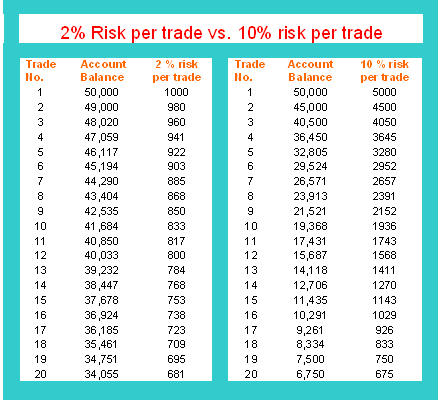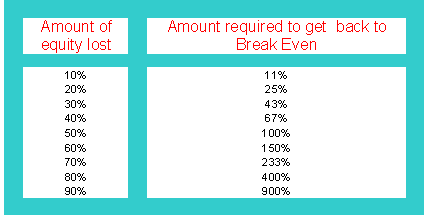DrawDown vs Maximum Draw-down
In business in order to make a profit one must learn how to manage risks. To make profits in trading you need to learn about the various oil money management strategies discussed on this learn Oil Trading tutorial website.
When it comes to trading, the risks to be managed are potential losses. Using oil money management rules will not only protect your oil trading account but also make you profitable in long run.
Draw-down
As traders the number one risk is known as draw-down - this is the amount of money you've lost in your oil trading account on a single oil transaction.
If you have $10,000 capital & you make a loss in a single trade of $500, then your drawdown is $500 divided by $10,000 which is 5% draw-down.
Maximum Draw-down
This is the total amount of money you've lost in your oil trading account before you start making profitable trades. For example if you have $10,000 capital & make 5 consecutive losing trade positions with a total of $1,500 loss before making 10 winning trades with a total of $4,000 profit. Then the draw down is $1,500 divided by $10,000, which is 15% maximum draw-down.

DrawDown is $442.82 (4.40%)
Maximum DrawDown is $1,499.39 (13.56 %)
To learn how to generate the above reports using MT4 platform: Generate Reports in MetaTrader 4 Guide
Crude Trading Money Management
The examples displayed below shows the difference between risking a small percent of your capital compared to risking a higher percent. Good investment principles requires you as a not to risk more than 2% of your total account equity.
Percent Risk Technique

2% & 10% Risk Rule
There's a big difference between risking 2% of your equity compared to risking 10% of your equity on a single transaction.
If you happened to go through a losing streak and lost only 20 trades in a row, you would have gone from starting trading account balance of $50,000 to having only $6,750 left in your account if you risked 10 % on each trade. You would have lost over 87.50% of your equity.
However, if you risked only 2% you would have still had $34,055 which is only a 32 % loss of your total equity. This is why it is best to use the 2% risk management strategy
The difference between risking 2% & 10 % is that if you risked 2 % you would still have $34,055after 20 losing trades.
However, if you risked 10 % you would only have $32,805 after only 5 losing trades that's less than what you would have if you risked only 2 % of your account & lost all 20 trades.
The point is you want to setup your rules so that when you do have a loss making period, you will still have enough capital to trade next time.
If you lost 87.50% of your capital you would have to make 640% profit to get back to break-even.
As compared to if you lost 32 % of your capital you would have to make 47% profit to get back to break-even. To compare it with the examples 47 % is a lot easier to breakeven than 640% is.
Chart below shows what percent you would have to make to get back to break even if you were to lose a certain percentage of your capital.
Concept of Break Even

Account Equity and Break Even
At 50% draw-down, one would have to earn 100% on their invested capital - a feat accomplished by less than 5% of all traders worldwide - just to break even on an account with a 50% loss.
At 80% draw-down, one must quadruple their equity just to bring it back to its original equity. This is what is called to "break-even" i.e. Get back to your original trading account balance that you deposited.
The more you lose, the harder it is to make it back to your original account size.
This is the reason why you should do everything you can to PROTECT your equity. Don't accept to lose more than 2% of your equity on any 1 single transaction.
Oil money management is about only risking a small percentage of your capital in each transaction so that you can survive your losing streaks and avoid a large draw-down on your account.
In Oil, traders use stop loss oil orders which are put in order to minimize losses. Controlling risks it involves putting a stop loss oil order after placing an order.
Effective Risk Management
Effective risk management requires controlling all the trading risks. A trader should create a clear oil money management system and a plan. To be in Oil Trading or any other business you must make decisions involving some risk. All factors should be measured to keep risk to a minimum & use the above tips on this guide.
Ask yourself? Some Tips
1. Can the risks to your investing activities be identified, what forms do they take? and are they clearly understood & planned for? All the risks should be taken care of in your Oil Trading plan.
2. Do you grade the risks faced by you when trading in a structured way? - Do you have a trading plan? - have you read about this course which is extensively covered discussed here on this Site.
3. Do you know the maximum potential risk of each exposure for each transaction that you place?
4. Are decisions made on basis of reliable & timely data & based on a strategy or not? Have you read about oil trading systems here on this website guide tutorials.
5. Are the risks big in relation to the turnover of your invested capital & what impact could they have on your profits margins & your margin requirements?
6. Over what trading time periods do the risks of your trading activities exist? - Do you hold trades longterm or shortterm? what type of trader are you?
7. Are the exposures a one-off or are they recurring?
8. Do you know enough about the ways in which your Oil Trading risks can be reduced or hedged and what it would cost if you did not include these measures to reduce potential loss, & what impact would it make to any upside of your profit?
9. Have your rules been adequately addressed, to ensure that you make and keep your profits.



